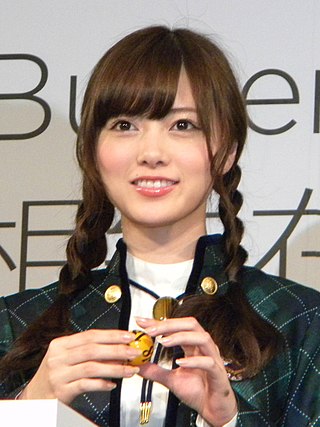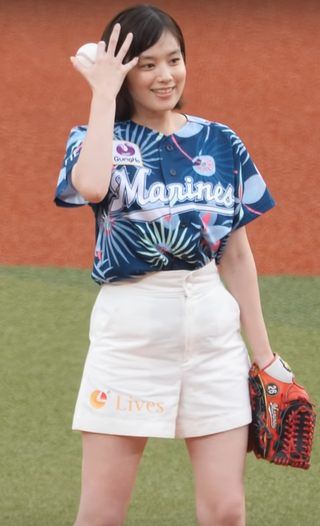
Weekly Shōnen Sunday is a weekly shōnen manga magazine published in Japan by Shogakukan since March 1959. Contrary to its title, Weekly Shōnen Sunday issues are released on Wednesdays. Weekly Shōnen Sunday has sold over 1.8 billion copies since 1986, making it the fourth best selling manga magazine, only behind Weekly Shōnen Jump, Weekly Shōnen Magazine and Weekly Young Jump.

Barazoku (薔薇族) was Japan's first commercially circulated gay men's magazine. It began publication in July 1971 by Daini Shobō's owner's son and editor Bungaku Itō, although before that, there had been Adonis and Apollo, its extra issue, around 1960 serving as a members-only magazine. Barazoku was Japan's oldest and longest-running monthly magazine for gay men. However, it halted publication three times due to the publisher's financial hardships. In 2008, Itō announced that the 400th issue would be the final one. The title means "the rose tribe" in Japanese, hinted from King Laius' homosexual episodes in Greek mythology. The magazine was printed in Japanese only. Barazoku's Bungaku Itō coined the term for the Japanese lesbian community as which the slang term for lesbian yuri comes from.

Jump Festa is an annual manga and anime fan convention in Tokyo, Japan. it is organized by Shueisha, publisher of the various Jump anthologies, with Jump Festa focusing specifically on the Shōnen manga magazines such as Weekly Shōnen Jump, Jump Square, V Jump, Saikyō Jump and Shōnen Jump+. The exposition was started in 1999, and is held for two days in December with over 100,000 people attending every year. New manga, anime, films, games, and merchandise are introduced during this event. Manga artists of popular current and former Jump series are often on hand, and many of them have panels where they answer questions. The festival's mascot is named Kaizo-kun (KAIZOくん) and was designed by Akira Toriyama.

JJ is a Japanese fashion and lifestyle magazine published by Kobunsha. It was established in 1975 as an extra issue of Josei Jishin, and was the first women's magazine for college students in Japan. Most readers of JJ are females between the ages of 17 and 26, and range from college students to office workers.

Kiss is a monthly Japanese josei manga magazine published by Kodansha, with a circulation reported at 81,870 in 2015. The magazine is headquartered in Tokyo.
Natalie is a Japanese entertainment news website that debuted on February 1, 2007. It is operated by Natasha, Inc. The website is named after the song of the same name by Julio Iglesias. Natalie has been providing news for such leading Japanese portals and social networks as Mobage Town, GREE, Livedoor, Excite, Mixi, and Yahoo! Japan. It has also been successful on Twitter, with 1,510,000 followers as of February 2017, being the third-most-followed Japanese media company, after The Mainichi Shimbun and The Asahi Shimbun.
Hirokazu Hamamura, former Weekly Famitsu chief editor, now is president of Enterbrain. He is also the director of Kadokawa Group Holdings, Kadokawa Group Publishing, Kadokawa Games and Walker Books. His pen name is Hamamura Tsūshin (浜村通信).
Yōko Mitsui was a Japanese poet.

Mai Shiraishi is a Japanese singer, model, YouTuber and actress who is a former member of the Japanese idol girl group Nogizaka46.

Hirona Yamazaki is a Japanese actress who is represented by the talent agency Toho Entertainment.

Miwako Kakei is a Japanese actress, model and variety tarento. Kakei is represented by Platinum Production and is an exclusive model for JJ.
Himeka Nakamoto is a Japanese mental health counselor, radio personality, author, and former idol. She was a first-generation member of the idol group Nogizaka46.
Friday is a Japanese weekly magazine that contains celebrity gossip, politics, news, and simply. It is published by Kodansha. New issues are released every Friday, hence the name.
Kenta Izuka is a Japanese actor and television personality associated with Amuse Inc. He is known for roles in Musical: The Prince of Tennis, Kyō Kara Ore Wa!!, and Shônen/Call Boy (2018), the television adaptation of Pornographer (2018)

Ryoko is a Japanese manga series written and illustrated by Kaito Mitsuhashi. It was serialized in Shogakukan's Weekly Shōnen Sunday from October 2016 to June 2019, with its chapters collected in five tankōbon volumes.
Tatsuki Fujimoto is a Japanese manga artist, known for his works Fire Punch and Chainsaw Man.

Miku Kanemura is a Japanese singer and model. She is a member of the Japanese idol girl group Hinatazaka46 and an exclusive model for the women's magazine Bis.
Meru Nukumi is a Japanese model and tarento from Inazawa, Aichi Prefecture. She is represented by the talent agency Avex Management and is currently active in Tokyo. Nukumi was a former Popteen magazine model and is currently an exclusive model for the fashion magazine CanCam.

Gemaga was a Japanese video game magazine founded in 1984 as Beep and published by SB Creative. During its history, it was known variously as Beep, Beep! MegaDrive, Sega Saturn Magazine, Dreamcast Magazine, Dorimaga, and finally Gemaga. When it ended publication in May 2012, it was the longest-running Japanese game magazine.
Junichi Yamakawa is a pseudonymous Japanese manga artist, whose works in the gay manga genre were published in the gay men's magazine Barazoku and its manga supplement Bara-Komi in the 1980s. Distinguished by his works depicting male–male sexual relations with heightened and exaggerated storylines, Yamakawa is best known for his manga Kuso Miso Technique, published in Bara-Komi in 1987. While Yamakawa's manga was originally published in relative obscurity, Kuso Miso Technique gained notoriety as an Internet meme in the early 2000s, leading to newfound public interest in the artist's manga.










